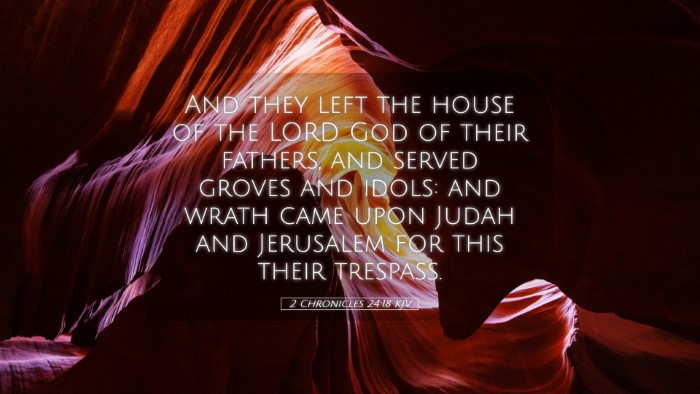Commentary on 2 Chronicles 24:18
Verse Context: 2 Chronicles 24:18 states, "And they left the house of the Lord God of their fathers, and served groves and idols: and wrath came upon Judah and Jerusalem for this their trespass." This verse encapsulates a critical turning point in the history of Judah, demonstrating the consequences of deviating from proper worship and covenant fidelity.
General Observations
This scripture illustrates the peril of apostasy, particularly within the context of the covenant community. After King Joash's reign, who began his kingship with a commitment to restore true worship, the people's departure from the Lord's service is noted. The rich history of Judah's kings reveals a recurring theme: the impact of leadership on communal fidelity to God.
Insights from Commentary
-
Matthew Henry:
Henry points out that the forsaking of the Temple reflects a broader spiritual decline in the nation. He emphasizes that Joash, who initially adhered to God's ways under the guidance of Jehoiada the priest, ultimately failed to maintain his devotion. The people's shift to idolatry serves as a reminder of the ease with which a community can turn from God when leadership falters.
-
Albert Barnes:
Barnes expands on the phrase "served groves and idols," denoting the two prominent forms of Canaanite worship that emerged during this reported apostasy. He identifies groves, often linked with Asherah worship, as symbols of divine allurements that pull people away from monotheism. This reflects an underlying human tendency to seek satisfaction in pagan practices instead of adhering strictly to God's commandments.
-
Adam Clarke:
Clarke provides a theological exploration of the 'wrath' that ensued following the people's decision to abandon true worship. He stresses that divine anger is a significant theme throughout Scriptures when covenantal obligations are neglected. Clarke highlights that this passage signals not merely a historical account but a warning of the spiritual consequences that arise from forsaking the living God.
Theological Implications
2 Chronicles 24:18 offers profound implications regarding the nature of sin, divine judgment, and community responsibility in worship. The departure from God's house represents a foundational breaking of covenant that results in moral and spiritual decay. The community's transition to serve idols underscores the importance of continuous renewal in leadership and spiritual disciplines.
Applications for Scholars and Pastors
This verse serves various applications:
-
Leadership and Influence:
One crucial takeaway is the significant influence that leaders have over their congregations. It stresses the responsibility leaders hold to foster a culture of worship and obedience to God.
-
Idolatry in Modern Context:
Pastors can draw parallels between ancient idol worship and modern-day distractions, considering what modern 'groves' threaten the integrity of their congregations. This analysis invites reflection on societal values that may subtly draw believers away from true worship.
-
The Nature of Divine Judgment:
The passage illustrates the reality of divine judgment resulting from disobedience, emphasizing the necessity for repentance and realignment with God’s will.
Conclusion
2 Chronicles 24:18 is a rich source for theological reflection on covenant fidelity, leadership impact, and the nature of idolatry. As both pastors and scholars reflect on its message, there is an urgent call to cultivate spiritual vigilance, maintain fidelity to divine worship, and pursue sanctification both personally and corporately.


